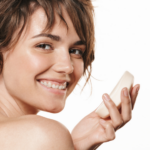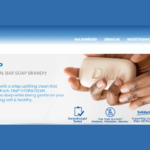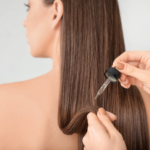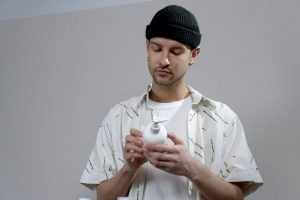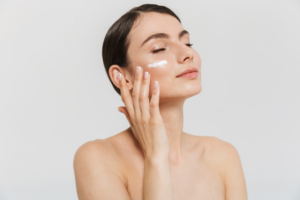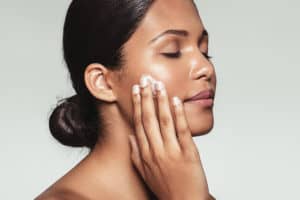For years I’ve been using African black soap on my skin. I use it a few times a week, in the evening, to help make my skin smooth and prevent acne and eczema. One day I was researching new products for my hair, and someone suggested using African black soap.
Can you use African black soap on your hair? African black soap is perfect for using on your hair. It has a high amount of glycerin and oils, making it great for cleansing and moisturizing the scalp and hair. It doesn’t leave your hair as hard and dry like a synthetic shampoo does, but it is still important to follow up with a conditioner.
Read on to learn more about how African black soap can help benefit your hair and scalp.
African Black Soap Benefits for Your Hair
African black soap is made with several ingredients that are effective at treating various dermatologic conditions. It’s created from organic materials, and it’s a natural source of iron and vitamin A and E. You can use African black soap on your hair as it gives similar benefits to when you use it on your skin.
Vitamin A is an essential vitamin for healthy hair. It repairs damaged hair and helps bring hydration to the scalp. One of the feature ingredients of many hair loss treatments is vitamin A as it is thought to promote hair growth. As an antioxidant, vitamin A also helps ward off free radicals in the environment. This prevents inflammation of the scalp and issues like acne.
Vitamin E supports a healthy and vibrant head of hair. It has natural antioxidants that help maintain and stimulate hair growth. Vitamin E also has antioxidant properties that are essential for lowering the amount of oxidative stress and free radicals that cause hair follicles to strip and break away.
DIY Homemade African Black Soap Shampoo Recipe
I usually wash weekly and then cleanse once a month using a clay cleanser, but with everything that’s been going on with my hair, I wanted to switch it up. I heard about the amazing medicinal qualities in African black soap to heal scalp issues and to get your hairs to start regenerating and growing again.
I want to share my African black soap shampoo recipe that I’ve been using that is amazing. This black soap smells really good, and all of the ingredients in the recipe are made to help either stimulate your hair growth, heal your scalp, kill any bacteria or fungus on there, and just clean the hair.
Black soap is made with the ashes of plantain skins with adds strength and nourishment to your hair.
Also, black soap is made with cocoa pod powder, which also helps make the hair vibrant and soothes the scalp. Cocoa pods are high in antioxidants. The cocoa pods help to repair the damage done to your hair and skin by environmental toxins.
All the ingredients that I add in this African black soap hair treatment recipe have a purpose, and if you’re somebody who’s suffering from any type of hair growth issues or scalp issues, you will probably find this recipe to be very helpful.
If you want to go all out, you can even make your own African black soap hair treatment following this post: Real African Black Soap Ingredients and Homemade Recipe.
Ingredients
For the African black soap recipe that is perfect for the hair, you’ll need a few items:
- Real African black soap
- Jojoba oil
- Pure and natural vegetable glycerin
- Argan oil
- Vitamin E
- Neem oil
- Lavender essential oil
- Tea tree essential oil
- Peppermint essential oil
- Rosemary essential oil
Remember, you can use all of these ingredients or only what you have available. You can definitely customize this African black soap hair treatment recipe to make it work for you.
Step #1: Mix Black Soap Shavings with Water
So grab your African black soap. I use about one ounce to use in my recipe. Of course, you can use more or less depending on your preference. I shave that piece of African black soap with a knife into small pieces and place it into a small mason jar.
When you’re doing this, you’ll notice the soap is extremely soft and breaks apart really nicely. The smaller your shavings are, the quicker it’s going to dissolve so try to cut them nice and thin.
When your piece of African black soap is all shaved, and inside your mason jar, we’re going to add some warm water to it to transform it into a liquid form. You want this water to be warmer than room temperature.
I make sure to boil it, and then I set it out on the counter to cool down to a warm temperature. You don’t want it too hot, but the warm water is going to help that soap dissolve quickly.
You can add as little or as much water as you want. It just depends on whether you like a thin or thicker shampoo consistency. I kind of like it to be in the middle, so I just pour in enough water so that it’s about half an inch over the top of the soap shavings in the small mason jar.
Step #2: Mix in the Remaining Ingredients
First, I add jojoba oil. There’s going to be about 1/2 tablespoons of jojoba oil is great for your hair and scalp. It’s the oil with the closest structure to our natural hair sebum.
I’m adding in 1 teaspoon of actual vegetable glycerin. Vegetable glycerin is a natural humectant that helps to attract moisture to your hair in wet environments. It also helps to define your curls and reduce frizz.
Another option is to add shea butter. Shea butter with African black soap is an excellent combination that is extra luxurious.
I also add in about 1/2 a teaspoon of argan oil. Argan oil is extremely rich in fatty acids and antioxidants and nourishes your dry, damaged hair and scalp. It also promotes cell regeneration and moisturizes dry skin.
I add vitamin E to preserve the mixture. Most importantly, it’s packed with antioxidants protecting the hair from free radicals. I use about 1 teaspoon of vitamin E oil. To learn more about the benefits of vitamin E, see our post: What Vitamin Deficiency Can Cause Itching?
I use about 1 teaspoon of neem oil. Neem oil is also rich in antioxidants. It promotes thicker, stronger hair and helps protect dry skin. It has antifungal, antiseptic, and antibacterial properties, which are great for healing scalp conditions and itchiness. It also promotes hair growth along with the shea butter.
I then add rosemary essential oil. I’m using about 10 drops. I really don’t need too much of this as it’s pretty strong. This is another natural preservative that’s full of antioxidants. It has antibacterial and anti-inflammatory properties, which means it’s great at reducing hair loss.
It’s also a natural stimulant that increases blood circulation to the scalp promoting hair growth. African black soap is great for use in the hair by itself but even better when mixing it with these oils.
I add about 10 drops of tea tree essential oil, which is amazing at soothing dry skin, itchy scalp, and treating common scalp conditions. It’s full of antifungal antibacterial, antiseptic, antiviral, and anti-inflammatory essential oil, which smells so good.
It also helps to nourish and stimulate your hair growth and has many antiseptic properties. To learn more about tea tree oil and its many benefits, see our post: Use Tea Tree Oil for Dark Spots on the Face.
Step #3: Lid the Jar and Let Sit At Room Temperature Until the Soap Shavings Have Dissolved
All of these ingredients combine and create a powerfully healing shampoo, perfect for cleansing while promoting hair growth and treating scalp issues. When all your ingredients are added, give it a light stir and make sure everything mixes together. You’re going to notice right away the unbelievable scent from this mixture. It smells so amazing, so good.
I just place a cover on top of that jar and let it sit on the counter so that all the African black soap shavings are going to dissolve and mix with that warm water and all those nutrients. Sometimes I’ll stop by to mix everything up again just to encourage those shavings to dissolve even faster.
Step #4: Pour the Mixture Into an Application Bottle Using a Funnel
After about two hours, all the African black soap shavings should be completely dissolved, and your shampoo is ready to use. I then transfer this mixture into an application bottle which makes it easier to apply it on my scalp in the shower. I use a funnel to transfer that liquid into the bottle.
When all is said and done, we’ve created about five and a half ounces of homemade African black soap hair solution. Of course, how much you personally make is going to depend on how much water you’ve added.
How to Wash Hair with African Black Soap
This is probably obvious, but I just apply it to my scalp like a normal shampoo. I’m really wanting to make sure that I’m applying the shampoo to my scalp and not the hair strands so that it is not too drying. So placing the applicator bottle into my scalp and massaging it in.
Apply it to your hair however you want and after you work the shampoo into the scalp, just rinse it out completely. Follow up with your conditioner, and that’s it.
When you rinse this mixture out of your hair, it doesn’t feel stripped at all. You get super-soft, moisturized, and clean hair, and all this from your own homemade African black soap hair treatment.
I use the shampoo weekly now. I love how it is really moisturizing. It does not cause dry skin on the scalp. It does leave your hair tangled as a normal shampoo does. But of course, you’re going to follow it up with a conditioner; otherwise, your hair would be too hard and dry – but not as hard and dry as a normal shampoo.
Can You Use African Black Soap on Your Hair?
So, can you use African black soap on your hair? African black soap can definitely be used on the hair. Just like for the skin, It provides many benefits for the hair and scalp, especially for dry skin type skin. Mix small shavings in with essential oils to make your own African black soap shampoo recipe.
African black soap has many uses, not just for cleansing the skin, but, as you can see, as an effective cleanser and treatment for your hair.
As far as shampoos go, this is definitely the most moisturizing shampoo I have ever used. When it washes out — even though your hair is tangled and you need to still follow up with a conditioner just to get the tangles out of your hair – it is still soft and moisturized.
The five-and-a-half-ounce bottle lasts me three weeks. You could probably get to last longer if you want. When I’m not using it, I store it in the fridge and then just give it a shake when you want to use it. A little, tiny three-ounce bar of African black soap can last you a little over two months using this method.


